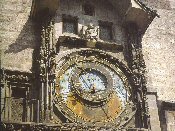 |
 |
|||



Paradigm Shift in Kafka's "In the Penal Colony"
by Michael Segedy

Kafka’s “In the Penal Colony” has fostered countless debates over its meaning. Most readers would agree that it is a terrifyingly unforgettable story that delivers, with a violence, a condemnation of man’s inhumanity to man. However, the darkness of the tale can overshadow its affirmative message. Like most of Kafka’s stories, the meaning must be wrested from the details. Kafka uses dark, violent imagery to establish a grim time before mankind conceived of a humane system of justice based on principles grounded in the Enlightenment.
Invested with a sort of divinity, the old commandant, representing an old, barbaric way of life, was the supreme authority on the island. Only he and a few of his followers could understand his “sacred,” inscrutable laws regarding judgment and punishment. The old commandant’s drawing used to program the machine is so “holy” the officer will not permit the traveler to handle it. The traveler responds that the drawing is “most artistic” but he can’t “decipher it.” It is akin to an indecipherable religious text, artistically rendered, but meaningless to anyone outside a tiny circle of the master’s disciples.
Blind conformity to the law is what the officer demands of the accused. In a lawless, barbaric world, the poor wretch resorts to his baser instincts: “Instead of then standing up and apologizing, the man … yelled, 'Drop that whip or I'll eat you alive!'” He establishes no rational connection between his alleged crime and his punishment. Nor is the old system concerned with establishing guilt or rendering justice. The old commandant saw justice as punishment for breaking a law, and the officer serves only as his fanatic disciple. The punishment does not need to fit the crime, when there is no reason to justify anything. The prisoner had failed to stand at attention on the hour and salute the captain’s door, and for that, the punishment is death.
The officer tells the traveler: “‘This procedure and this form of execution, which you now have the opportunity of admiring, currently have no open supporters left in our colony. I am their sole champion, just as I am the sole champion of the old commandant's legacy…. When the old commandant was alive the colony was full of his supporters.’” The old commandant’s system of blind justice is in the process of being replaced by a more humanitarian one. This also explains the influence of the women on the new commandant. Overcome, the officer acquiesces to the new order and unsheathes his sword, breaks it into pieces, and gathers “everything together, the bits of sword, the scabbard, and the sling, [hurls] it all from him with such force that it [hits] the bottom of the pit with a clang.” His act symbolizes the end of an era. The new world order, symbolized by the explorer, as well as by the new commandant and his coterie of women advisors, embraces a humane justice system that extends rights to all, even dull-witted characters, such as the prisoner and the soldier.
The officer, the last real proponent of the old system of justice, goes down with his machine. The machine self-destructs when it must inscribe the words “be just” on the officer’s body because it cannot fulfill its purpose. The officer has failed the old commandant, the old law personified, and he must do what is “just.” "Be just," it says,' the officer repeated. 'Possibly,' said the traveler. 'I believe you.' 'Right,' the officer said, partially satisfied at least, and he took the sheet with him in the scriber and then appeared to rearrange the entire gear mechanism….” The old system was on “the point of being abolished,” so he was acting “quite properly.” His code of justice required applying the same justice to himself. The traveler looks at the officer’s corpse and sees that it was “… just as it had been in life, with no sign of the promised deliverance; what all the others had found in the machine, the officer had not found.”
The epitaph on the old commandant’s grave stone reads: “It is prophesied that the commandant will rise again after a certain number of years have elapsed and lead his followers out from this house to re-conquer the colony.” The undignified description of the commandant’s “shrine” reveals it as a soon-to-be forgotten gravesite located in an obscure place under a common table. No supplicants visit the site and pay homage. The few present sit around drinking tea and chatting with their feet planted soundly over his resting place. “Wait in faith!” the inscription declares, but the men “around him and smiling as if they had read the inscription with him, found it ridiculous, and were inviting him to share their view.” The men’s feet planted firmly on the gravestone say it all. They have no intention to return to their barbaric past.
In the final scene, the traveler refuses to let the two soldiers on the boat. The island is a microcosm of society in general, so they, as citizens, must inherit the moral system, contributing to its changes or acquiescing to the laws others make for them. That will be their choice. “They could have leapt into the boat, but the traveler, picking up a heavy length of knotted rope from the floor of the boat and threatening them with it, prevented them from making the attempt.”
Through a surrealistic, nightmarish tale, Kafka ingeniously depicts a special moment in human history when mankind made the choice to break from his lawless, authoritarian past and construct a better future. The smiles on the tea house men tell it all. No one is waiting in faith for the return of the old commandant. No, history has moved on with a new and brighter vision. Kafka isn’t that dark after all. And if nothing else, his story should remind us that it is in our hands to sustain that vision.

